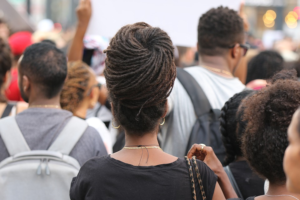 Racist standards of appearance and hairstyle are present all over the country. Hairstyles and the natural hair of people of color—women of color, in particular—are often deemed by workplaces to look messy or unprofessional, and thus are banned or discouraged. In reality, these hairstyles usually just don’t align with the societal standards set by white people.
Racist standards of appearance and hairstyle are present all over the country. Hairstyles and the natural hair of people of color—women of color, in particular—are often deemed by workplaces to look messy or unprofessional, and thus are banned or discouraged. In reality, these hairstyles usually just don’t align with the societal standards set by white people.
New York state and New York City have had a busy year when it comes to banning this form of racial discrimination. The city banned it back in February, while the state did so just a couple weeks ago, on July 12—becoming only the second state to enact such a law.
Direct and outright discrimination isn’t the only way people of color feel the effects of these racist societal standards being imposed on them. They also suffer from micro-aggressions, as demonstrated in a New York Times piece on NYC’s hairstyle discrimination ban. Black people are told in various ways by various people that they should change their hair, either as a suggestion for style or as a condition of employment.
The New York Times piece spoke to black women in NYC about their experiences. One was told to cut her long hair by her manager, despite other women of different races not receiving the same directive. Another was told by her supervisor that she should straighten her hair or style it in some way, despite her hair already being styled.
Dove, which founded the CROWN (Creating a Respectful and Open World for Natural hair) coalition, reports that black women are “80% more likely to change her natural hair to meet social norms or expectations at work,” and “50% more likely to be sent home or know of a black woman sent home from the workplace because of her hair.”
Along with these statistics, Dove also points out the negative effects that racial discrimination (hair discrimination included) have on us all. Diversity is good for the workforce’s bottom line, Dove reports, and discrimination thus hurts not only the individual women who are victimized but also the economy as a whole.
New York City’s Commission on Human Rights instituted guidelines banning hair discrimination, which applies to all employees regardless of race. However, in recognizing how hair discrimination widely and disproportionately affects black people, it also specifies that hairstyles that are often donned by people of color are protected. Employees in the city are specifically permitted to maintain “natural hair, treated or untreated hairstyles such as locks, cornrows, twists, braids, Bantu knots, fades, Afros, and/or the right to keep hair in an uncut or untrimmed state,” the law states.
Violations of the commission guidelines can carry up to $250,000 in penalties, and no cap exists for damages. It specifically denotes hair discrimination as racial discrimination.
While they are technically called “guidelines,” these new rules have essentially the force of law: the NYC Human Rights Commission’s legal enforcement bureau can conduct investigations, subpoena witnesses, and enforces those previously stated hefty penalties.
Requiring employees to wear a hair net will still be permissible so long as all employees must and it doesn’t just apply to select hairstyles.
The New York State law, implemented just this month, is similar to the NYC guidelines. In amending the state’s already-existing Human Rights law, it bars racial discrimination on the basis of “traits historically associated with race, including but not limited to hair texture and protective hairstyles.”
New York State Assembly Member Tremaine S. Wright—who worked to pass the bill—released a powerful statement after Governor Andrew Cuomo signed the law:
“As a Black woman who prioritizes equity, and has worn my natural for 17 years, this bill is deeply personal for me. I determined a legislative fix was in order and decided I’d carry the CROWN Act in NY. I am beyond proud to have done so, and for New York to be the first state to have had this historic bill passed in both chambers.”
As the New York Times points out, more and more women of color are in the public eye—such as gubernatorial candidate Stacey Abrams and Congresswoman Ayana Pressley—who wear their hair naturally or styled in a way that is inconsistent with white culture. Thus, the issue of hair discrimination is becoming more and more visible. In addition, those hairstyles will hopefully become more and more normalized.